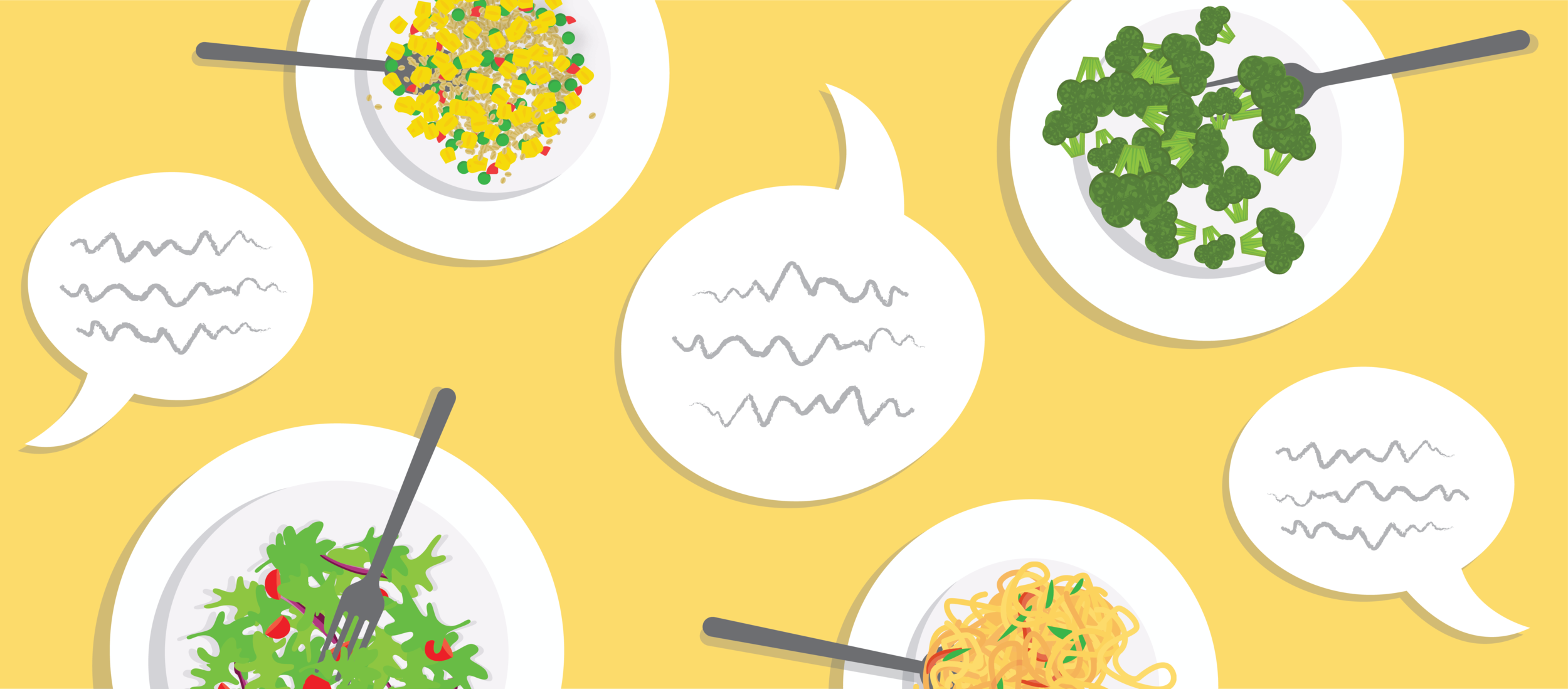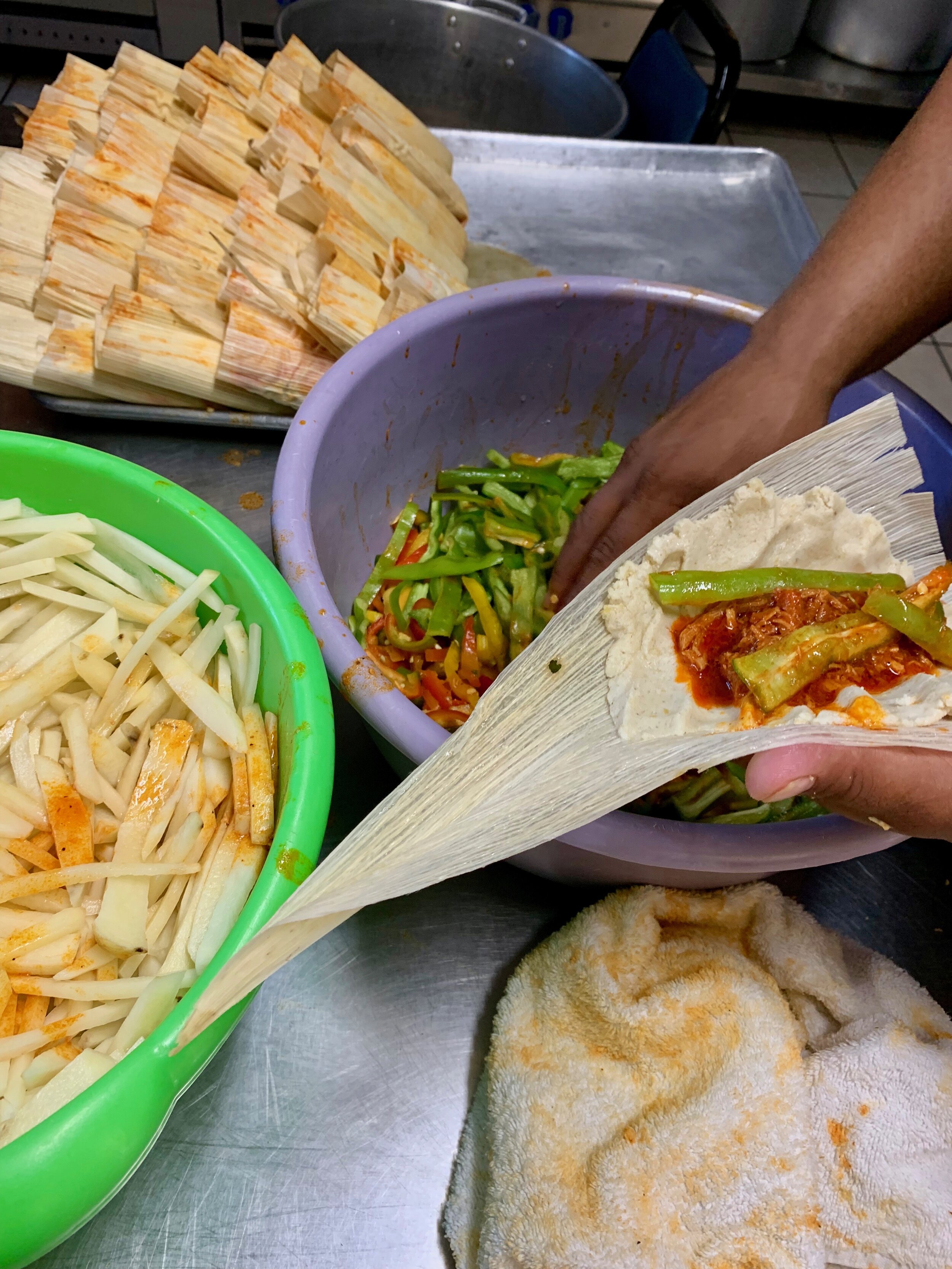The Humanizing Power of Food for People In Between
The Humanizing Power of Food for People In Between: The importance and power of using food aid to evoke identity, dignity, and respect.
*The names of all shelter guests and volunteers have been changed for their safety.
Just beyond the border wall at San Ysidro, where families crossing to seek asylum in the US pass Americans being deported to Mexico, five women chop onions in a kitchen.
The kitchen belongs to Casa Del Migrante, one of approximately 26 migrant shelters located in Tijuana, Mexico. Specific numbers are difficult to determine, as many opened recently in response to the growing humanitarian crisis at the U.S./Mexico border. This section of the border, which billboards boast as the “world’s most-crossed border,” has seen increased traffic, partially as a result of stricter immigration control coming from the Trump administration.
The almost comically named “Migrant Protection Protocols”, implemented by the administration in January of this year, have done anything but, in requiring many asylum seekers to wait out their legal proceedings in Tijuana, putting lives in danger and restricting access to important legal assistance and resources. Since implementation, 32,000 migrants had been returned to Mexico as of last month to wait for their number and receive a court date, according to an August 18th New York Times article.
These changes have overwhelmed shelters in Tijuana, most of whom receive no governmental funding and rely exclusively on donations from individuals and civic organizations. Against all odds however, these shelters, and in particular their kitchens, have become a site of resilience and resistance.
At the Casa del Migrante shelter, a group of local women, lovingly referred to as the “Cocineras”, volunteer to cook meals for the guests. As soon as you step foot into the kitchen, you swiftly realize that these ladies run the show. They all live outside the shelter and come weekly to volunteer, some with two years of service under their belt, others with as much as 27. The men call them “Madre” or “mother” in Spanish, and they dole out chopping orders and lectures when someone doesn’t eat their vegetables.
During one of my first days in the kitchen Doña Carolina was stuffing corn masa with a mix of homemade chicharron, vegetables, and salsa. I asked how she knew how to make tamales and she and the other women in the kitchen laughed. “I’m Mexican,” she replied.
Food is intimately connected to our identities, even if we are unaware of it. Many academic studies have documented this connection, concluding that, although born with inherent preferences, we begin to connect certain foods to who we are as early as childhood. This connection is especially strong within the context of this migrant kitchen, where people are straddling their old nationalities with their new.
The meals vary depending on what is available through donations, but they are primarily Mexican, with the majority of menus consisting of rice, beans, and a meat-based stew. Some days we deviate and serve hamburgers or bagel sandwiches, with a salad on the side when lettuce donations come in.
The food is great, but far from gourmet. And yet I learned that in addition to the 50 or so guests living at the shelter while I was there, there were an additional 80 mouths to feed. For both breakfast and dinner, guests who had previously stayed at Casa but have since moved on to find jobs and their own apartments are welcome to come back and eat at the house. If the people initially come for the food, they come back for the family.
Through their food, the Cocineras make Casa feel as close to a “home” as possible. One man I spoke with, who was deported from McAllen, Texas after having lived there for almost his entire life, mentioned that the food in the shelter, in comparison to what was served in ICE detention, was real. Even if some meals were similar, the food here was less “artificial.” Many other guests noted the same difference, pointing out that all of the food is handmade and made from scratch. They know this because they are asked to help in the kitchen, whether it’s chopping onions, peeling cucumbers, or juicing limes. Contrary to the popular belief that “beggars can’t be choosers”, these women go above and beyond to ensure that the food they are serving is clean, healthy, and delicious. Although some may think quality is the last thing on someone’s mind when they’re hungry, it is the critical factor that brings food from pure sustenance to greater fulfillment. This is especially pertinent now, with deportation numbers are rising and asylum seekers being asked to wait longer than ever before. When I asked why food quality mattered, one guest told me that it shows him that those preparing the food care.
With this in mind, sometimes regardless of quality, certain foods were still refused, while others were given as seconds, and even thirds when available. Although the Cocineras were ultimately in charge of what was being served, many guests exercised agency over what they did or didn’t eat. For example, Jonathan from Cameroon always refused the beans. When I asked why, he told me that they are cooked differently from back home. This differs from the experience of Cesar, an older man from Guatemala, who is more accustomed to red beans than the pinto beans served in Mexico, but enjoys trying the new food and has become “accustomed” to them now. Regardless of what is or isn’t being eaten, the ability to choose and thus have agency over one’s physical body gives guests more control, especially in a world where they have anything but. In a life-history interview with Noah, a 23 year old who was deported from Anaheim, California, he touched on the differences between the food services in the various juvenile detention centers, prisons, and rehab centers in which he had spent a majority of his adolescence and early adulthood. Although they each differed in quality and menu style, Noah always made sure to mention whether or not each location offered seconds. Being a young boy at the time, I believe it is still hard for him now to put all of those experiences into words. But the almost childlike gusto with which he described one of the chefs, who always snuck him and his friends extra snacks on the side or asked what they wanted from the store, shows the importance of not only having opinions over what happens with your body, but that someone will listen to said opinions and give you the opportunity to exercise that control. In addition to feeling cared for, giving guests agency over their food choices makes them feel more respected, and helps them to regain control they have lost through the migration process.
It wouldn’t be a family meal without the family. In addition to food quality and agency, the way the food is served, and with what attitude, also contributed greatly to the guests feeling important. In addition to cooking the meals, the Cocineras and internal volunteers serve them each night. Doña Alma doles out serving orders while telling the guys to eat more vegetables. Although she comes across firm at times, the guys smile, knowing she chastises them out of love. One respondent from Fresno told me that he feels this love when the women remember what he typically likes or doesn’t like. He said when you feel important, and when you are well fed, you are full physically, but also “moralmente,” which he defined as “spiritually”. It is then that you have the energy to keep going, and do what you need to do to start a better life for yourself.
At Movimiento Juventud, another shelter where I volunteered, this same provision extended outside of the shelter. At Movimiento Juventud, there was an unspoken tension regarding food “from outside,” as those with money would leave to buy pupusas from the cart down the street or Coca Colas and snacks from the drugstore on the corner. Although the shelter Coordinator told me she asks people to eat all purchased food outside, so as to not make those who can’t afford food feel bad, another guest shared with me that she disagrees, saying that each person does their own thing and should be able to eat what they want.
Jocelyn, one of the chefs from Mexico, was waiting on a money wire from her grandmother who was living in the states. She was frustrated that it hadn’t come yet, and said that “It’s embarrassing to have no one. I can’t go anywhere or buy anything.” Jocelyn felt incompetent not being able to fend for herself, and told me that being able to buy stuff shows that you have people who care about you. In other words, being able to buy food from the outside means you are loved.
Jocelyn shows us how the food you receive is a metaphor for the love and care others feel for you. If the exchange of food helps someone solidify who they are, then it also solidifies how we see the other. In other words, if when you provide you feel valued, when you are provided for, you feel loved.
Although the men and women in these shelters come from widely diverse backgrounds, they are all united by a shared wish for a better life, and the unsettling unknown they encounter on the way. The majority of these guests are much too occupied with thoughts of upcoming court dates or work interviews to be thinking actively about food. That said, it is clear that food aid plays a crucial role in this process, as a vehicle through which they can connect to themselves and others, allowing them to tap into a greater well of physical and mental strength. It is within these quiet moments of chopping onions, or passing tostadas, that they can reset and regain strength for the next day’s challenge. Anyone engaged in food-aid, namely politicians, non-profit organizations and individuals, should learn from these brave accounts. In acknowledging that quality food should be a key focus in food aid, rather than simply a privilege for wealthy or health-minded people, we create environments that extend beyond sustaining life, to supporting thriving new paths and recreations of identity.


